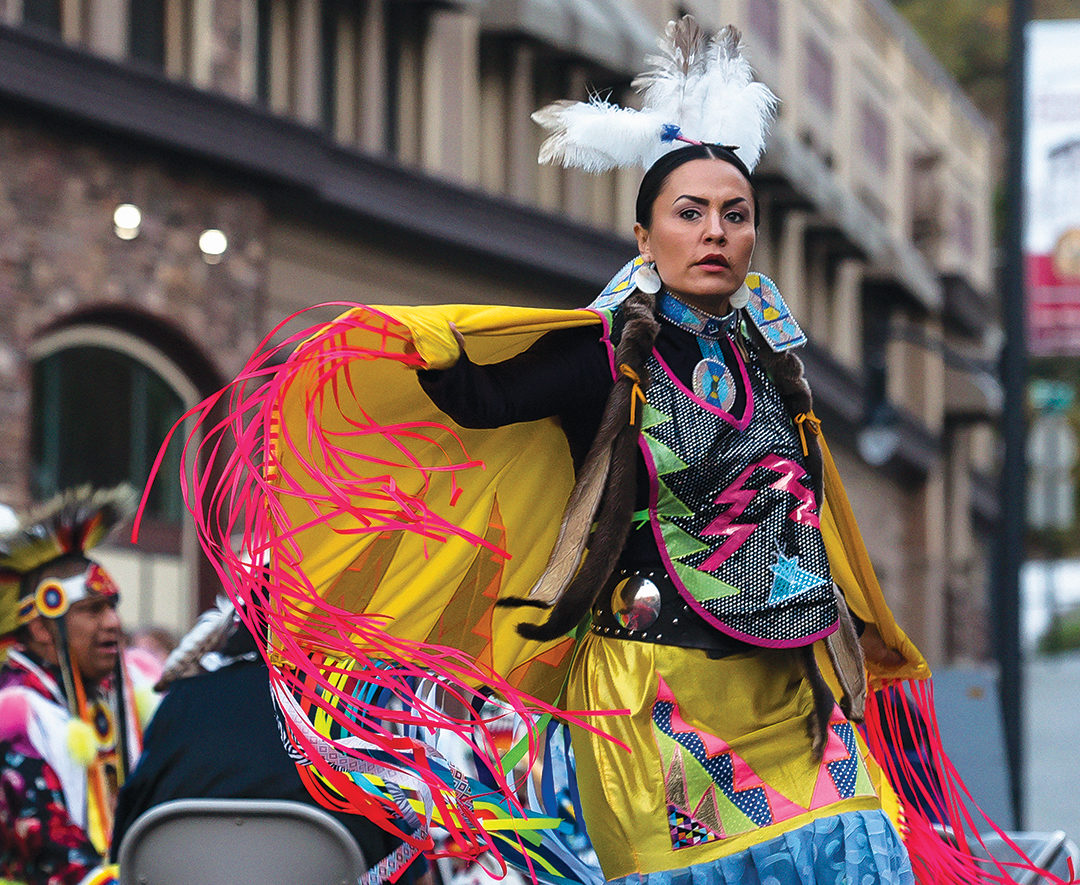During her darkest days, the undulating melodic quality of her grandfather’s songs were what inspired Stacia Morfin the most.
Morfin, whose Indian name is One Who Takes Care of Water, was serving a three-year stint at a federal prison in Victorville, California, when the words to the Nez Perce flag song came to mind.
“Those were the songs my ancestors hung onto, and they secretly shared them with friends,” she says. “When I was down there, I started remembering those songs again. The fight song, the honor song—they started to come back to me. I’d call my father and sing them over the phone, and he would identify which ones they were.”
Her father was Nez Perce (also known as the Nimiipuu), with her grandfather’s side coming from the Red Bird band and her grandmother from the Pile of Clouds band.
It’s only been six years since Morfin, 36, completed her sentence for drug dealing. She finished college, then jumped into marketing for an ad agency.
Two years later, an odd restlessness took hold of her. Together with her husband and two-year-old daughter, they set out for one of the tribe’s sacred sites on a mountain.
“I told Creator God I need direction,” she remembers. “I felt there was something more I could do.” She had barely begun singing a Nez Perce song when she had a vision of an elder in ceremonial dress. She says he told her she’d start a tourism business designed to preserve—and showcase—Nimiipuu culture. And that it would be connected with a body of water.
Morfin was taken aback. “I was thinking: me in cultural preservation? I never thought of myself as a hardcore traditional native. My first thought was that I was not adequate to do something like this.”
The next day she showed up at a small business center in Lewiston, Idaho, to research who was visiting the Nez Perce homeland, which at one time comprised 17 million acres in four states but is now down to 765,000 acres in north-central Idaho. It was then that she realized a lot of tourists were looking for some connection to the land’s original inhabitants. But none of the Snake and Columbia River excursions, Hells Canyon tours, gift shops or hotels in the region’s $4 million river boat industry was Native-owned.
“I realized that we have a huge market for river cruise boats,” she says. “Some 25,000 people come to the region from March through November for the cruises in Hells Canyon, the deepest river gorge in North America. There was no tribal member taking advantage of that.”
Moreover, she had the contacts with elder tribal members who were willing to share their stories.
On March 29, 2019, she founded Nez Perce Tourism in Lewiston, and her star has risen ever since. She began hiring fellow Nimiipuu to lead boat and ancestral homeland tours that connect people to the Nez Perce Nimiipuu culture through song, drum, dance and interactive storytelling in place.
That December, she took first place in the small business division of Lewis-Clark College’s annual Entrepreneur Challenge, walking away with $2,000. When the river boat tour business dried up in the spring of 2020 during COVID-19, Morfin pivoted to retail. Her Nez Perce Traditions gift shop, which opened in Lewiston a few months later, has done a brisk business. (“It’s in our DNA to trade and barter,” she says). Last December, she spoke at an indigenous speakers series sponsored by the University of Washington.
This spring, with tourism picking up again, she hired an extra nine to staff the store and “Hear the Echoes of Our Ancestors” boat tours. They also take tourists whitewater rafting and on Appaloosa horse rides, dinner tours and powwows. In 2019, she’d coaxed 55 drummers, singers, historians, dancers, presenters, storytellers and artists to work for her. More joined her this year.
“A lot of the tribe is not for tourism because of past relationships with colonial brothers and sisters who continue to exploit what we’ve shown them,” she says, “and because of past broken promises with the government. Getting your community involved is one of the first things you have to do when things are so sensitive.”
“Our values are completely backward from Western thinking. You take away the homeland, food, resources and clothing from people— this is hundreds of years of historical trauma—and you can easily lose your way, and that’s what happened to me,” says Morfin, referring to her time in prison. “I looked in the mirror and realized I didn’t love myself and didn’t know who I am. That really bothered me.”
That was about the time that Morfin started recalling the songs. She formed a drumming group. She started going to the prison sweat lodge. She realized she belonged to something greater than herself.
“Now I tell people where I come from, who my father and mother were, and their ancestors,” she says. “I am not a fancy CEO; I am who I come from. I am the one who takes care of water and knows where water comes from.”
Photo credit Rebecca Noble


